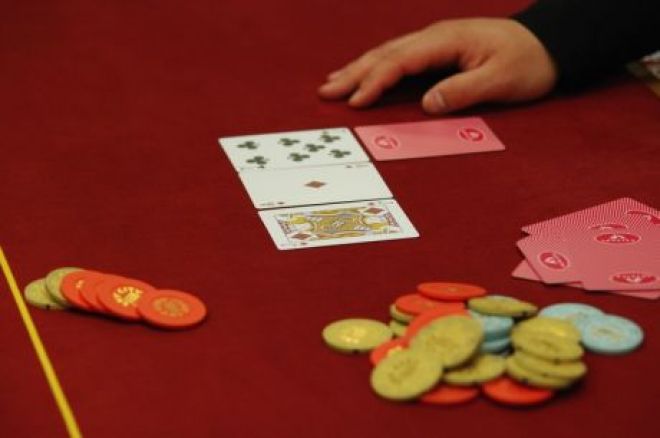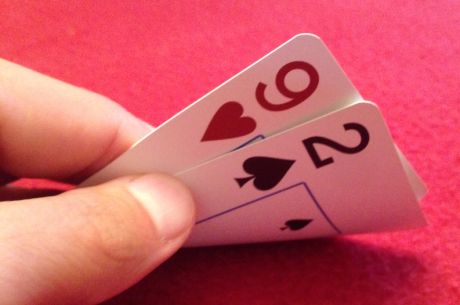Playing Pocket Kings or Queens When a Higher Card Flops

“The world is full of kings and queens,” once sang Black Sabbath, “who blind your eyes and steal your dreams.”
The song — the title track from their 1980 album Heaven and Hell — might well apply to the situation of being dealt KxKx or QxQx in no-limit hold’em, hands which can sometimes blind us from playing sound strategy, and steal our dreams, too, especially when a higher card falls on the flop.
If you listen to some players, the chance of an higher card hitting the flop when they hold KxKx or QxQx is 100%. But in truth it does happen fairly frequently — enough that it is definitely worth being prepared for how to proceed when it does. When holding KxKx, there’s just over a 22% chance an ace will come on the flop. When holding QxQx, there’s a better than 41% chance an ace or a king will flop.
But all is not necessarily lost when those higher cards fall.
Continuation Betting Despite the Higher Card
Let’s assume you raised before the flop with your premium pair — as you usually should do — and you find yourself up against one or two opponents going to the flop when that higher card hits. What next?
More often than not you will be making a continuation bet with your big pair if given the opportunity to do so, despite that higher card.
Some players immediately grow timid at the sight of the higher card and if checked to will check behind. Don’t become passive and/or give up on your KxKx if an ace appears on the flop. There will be times when your opponent isn’t going to like the sight of that ace, either, and will see your c-bet as indicating you’ve hit the flop by pairing a big ace and fold to your bet.
However, if you bet and are called — or raised — that’s when you will need to take other factors into consideration when deciding how to proceed.
Using Caution
Say you raise from middle position with K♦K♥, only the big blind calls you, the flop comes A♠J♣8♣, and your opponent check-calls your continuation bet. In this hand you’ve now seen your opponent perform two actions — calling your preflop raise from out of position, then calling your c-bet — that should help you narrow his or her range of possible hands.
Obviously there are many AxXx hands among your opponent’s possible holdings. So, too, might be hands like KxQx or 10x9x that give your opponent straight draws, hands with two clubs that provide a flush draw, lower pocket pairs (including jacks or eights), among other possibilities.
The relative looseness or tightness of the opponent is obviously worth considering here, too, when trying to establish a range. A player who has been constantly defending his or her blinds and/or seems to be calling a lot and showing up with medium-to-weak starting hands is going to have a wider range here that includes lots of hands that are behind your pocket kings. Meanwhile a tight player who has played few hands and only shows down monsters is more likely to have hit that ace (or better) after calling your continuation bet, his or her range being more narrow.
In either case, a reasonable default strategy for the turn and river will be to play conservatively. That means checking behind if checked to on subsequent streets, or even folding if your opponent starts to show strength by betting. That said, it isn’t good to make a habit of folding to small bets in these situations, as savvy opponents will start picking up on such weakness and exploit it mercilessly.
Sometimes you’ll be out of position with your KxKx or QxQx with a higher card on the board — a doubly uncomfortable spot — but your postflop approach should still be similar. More often than not you’ll still want to make that continuation bet on the flop, then if called you will likely have to become conservative thereafter, or if your c-bet is raised you may have to call or fold depending again on what kind of opponent you’re up against.
Avoiding Extremes
We might speak of this situation — holding a premium pocket pair and facing a higher card on the flop — as presenting three possible courses of action, two of which represent extremes that novice players often adopt to their disadvantage.
There’s the extreme of always shutting down immediately with KxKx when an ace flops, or with QxQx when an ace or king flops. At least make the continuation bet and make your opponent show you how he or she might feel about that higher card on the board — don’t just assume right away that you’re beat. (Worth noting: when holding queens a king on the board is usually less concerning than an ace, since players often will call preflop raises with more AxXx hands than they will with KxXx hands.)
Then there’s the other extreme of being stubbornly unwilling to let go of KxKx or QxQx no matter how much strength others are showing, which can be an even more costly habit. Don’t feel overly entitled when dealt kings or queens, and learn how to let such hands go when presented with postflop actions that indicate a high likelihood you have a pretty-to-look-at-but-second-best hand.
A hand from the final table of the 2007 World Series of Poker Main Event between eventual winner Jerry Yang and Raymond Rahme demonstrated an example of a player sticking with pocket kings on an ace-high flop. The situation was unique, of course, coming after 13 hours of poker on the seventh day of the world’s most presitigious poker tournament. But it still shows a player not wanting to let go of his big pair despite evidence supporting he might want to consider it. Take a look:
Finally, the best approach is that middle course, one in which you play your kings or queens strongly before and after the flop, but use caution thereafter once you find yourself still vying for the pot on the turn or river.
Don’t be unreasonably fearful that the higher card automatically equals trouble for you, but don’t be foolhardy, either, and talk yourself into believing an opponent showing strength isn’t actually strong.
In other words, it doesn’t have to be “heaven” or “hell” with kings or queens. When that higher card flops, play down-to-earth poker.
Get all the latest PokerNews updates on your social media outlets. Follow us on Twitter and find us on both Facebook and Google+!








